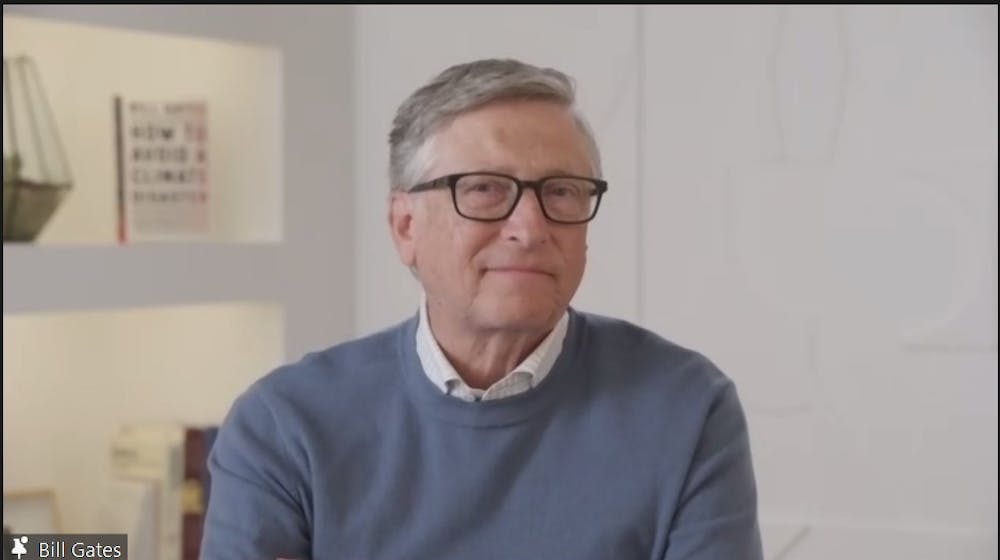Editor's note: Max Rubin, a staff columnist for The Eagle, was not involved in the reporting, writing or editing of this story.
Microsoft founder and philanthropist Bill Gates spoke about climate change at a virtual event Wednesday to an audience of students from American University and other D.C. universities.
“CBS This Morning: Saturday” co-host Michelle Miller moderated the discussion, while students from AU, George Washington, Georgetown and Howard universities also submitted their own questions as part of the event.
“The young generations … want to stand for more than their individual [successes], and climate policies are part of what they want to get behind,” Gates said.
Gates’ new book “How to Avoid a Climate Disaster: The Solutions We Have and the Breakthroughs We Need” was published Tuesday. In the book, Gates set out a plan for achieving net zero carbon emissions before the climate suffers irreversible damage. He spent a decade researching the causes and effects of climate change.
Gates said he hopes that helping the climate is not a partisan issue, but rather a collective effort among Americans.
“Ideally, no matter what party [people] associate themselves with, … the goal is not destroying ecosystems and destroying human livelihood, like climate will,” Gates said.
Gates remains optimistic about our future, especially given that President Joe Biden’s administration has prioritized addressing climate change. Taking a positive approach is more effective than using scare tactics, Gates said.
Max Rubin, a sophomore in the School of Public Affairs, agreed with Gates’ approach.
“When we act out of hope, then we act out of positivity,” Rubin said. “What we see is more collaboration, what we see is the willingness to work across party lines [and] different ideologies.”
Many audience members were curious about how to approach a net zero carbon future. Gates said that the answer is rooted in innovation and a “Green Premium,” the difference between the cost of “clean” technology and technology that would contribute to carbon emissions.
He recommended choosing sustainable food sources like Beyond or Impossible Burgers, both meat-free alternatives, over red meat. Raising cows results in the release of significant emissions of methane, a highly potent, planet-warming gas. We need to be mindful of the products we buy, Gates said.
Although climate activists, like Gates, generally recommend being an informed consumer, the larger issue stems from a small percentage of wealthy people rather than the general population, Rubin said.
“When we talk about how it’s on us to fix [climate change], it detracts from the system that’s created this problem that allows just a few people to impact us that much without any accountability or repercussions,” Rubin said. “If we shut the lights off more often or use our [cars] less and walk more, that’s not necessarily going to be the save-all.”
Gates’ prospect of a net zero carbon world also relies on a transition to nuclear energy, a controversial sector that creates radioactive waste.
“The beauty of nuclear [energy] is that it’s the only large-scale technology that doesn’t rely on the weather, like solar,” Gates said. “We need reliable energy all the time.”
Although critics attest to the risks and high costs associated with nuclear energy, Gates said that it is our best option compared to other sources.
“Pipelines burst, coal mines collapse, coal particulate makes people sick,” Gates said. “Nuclear actually has by far the best safety record, even with the current reactors.”
Gates urged the audience to care more about the climate and become educated on these issues.
“For the rest of your life, people are going to be talking about climate,” Gates said. “You’ll be a far more sophisticated reader and understand … ‘How big a deal is it?’”




